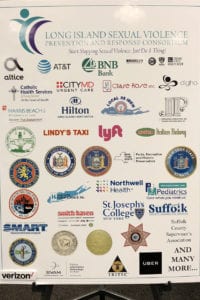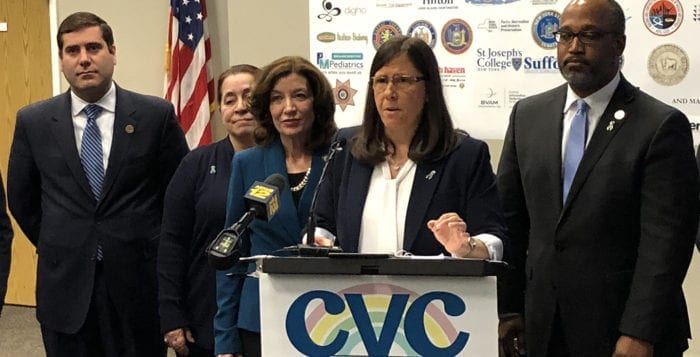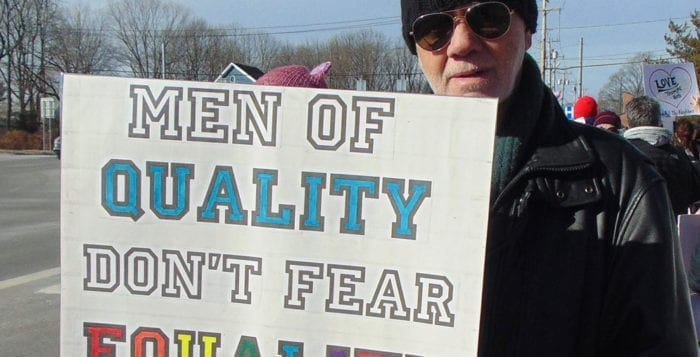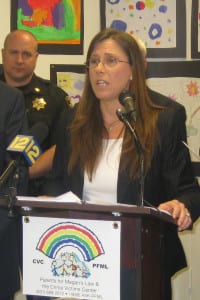By Alex Petroski
Leaders from private and public sectors came together April 20 to form a partnership that would make Randy Newman proud.
“You’ve got a friend in me,” was the message from members of the local business world following the creation of the Long Island Sexual Violence Prevention and Response Consortium, an initiative spearheaded by Laura Ahearn, executive director of Suffolk County’s The Crime Victims Center.

As a direct result of the #MeToo social media movement turned global awakening, societal response to accusations of sexual misconduct and crime has undergone a swift change, especially in cases in which the accused is of a high-profile. But lawmakers and advocates for the movement have been asking an essential question since the movement ensnared the likes of Harvey Weinstein and Larry Nassar back in 2017: How will men who are not famous perpetrating acts of sexual violence against victims who need their job to survive truly be held accountable? Ahearn’s consortium may serve as a model in answering that question.
“We asked them to just do one thing to help us prevent sexual violence, and we would be satisfied if that one thing was just to be a member of our consortium, because they’re very busy,” Ahearn said of her pitch to business leaders when trying to rally support for the partnership. “We didn’t want to pressure them, and we didn’t want to ask them for money, because every time they hear ‘not-for-profit,’ they’re like ‘money?’ So instead, what we did is we said ‘just do one thing. Just come to our consortium, give us your logo and you’ll be part of what we’re doing to raise awareness.’ There’s a certain amount of credibility that a big company adds to an organization just working to prevent sexual violence.”
The CVC, Ahearn’s organization, is a not-for-profit organization that has been a relentless advocate for victims of all crimes since the late ‘90s. It assists victims of child sex abuse and rape, provides services to victims of violent crime, and assists elderly, disabled and minor victims of all crime. To form the consortium, Ahearn presented a list of options businesses could incorporate into its standard practices, which if adhered to should make workplaces on Long Island safer for vulnerable members of the workforce.
The list of options businesses were asked to pick from and incorporate to become a member included adding a link to the LISVP consortium on businesses’ websites; providing prevention education and victim services materials in new employee orientation; adding prevention messages to receipts provided to customers; creating public service announcements; hosting training sessions aided by the CVC; and many more.
“All the degradation of women in the workplace that has gone on in the shadows throughout our lifetimes … it’s over.”
— Kathleen Hochul
Organizations signed on to be a part of the consortium so far include Stony Brook Medicine, Altice, Northwell Health, AT&T, Verizon, BNB Bank, Catholic Health Services of Long Island, TRITEC Real Estate Company, Uber, Lyft and many more. Ahearn said in most cases, leaders of the private sector institutions signed on to take more than one step on the list, and that only one organization she reached out to declined to join. She said she hopes to add to the current list of about 40 consortium partners.
Local lawmakers from virtually all levels of government also attended the April 20 press conference to announce the consortium in Hauppauge and voice support for the cause.
“All the degradation of women in the workplace that has gone on in the shadows throughout our lifetimes, whether it’s the insidious, quiet comments, innuendoes, or whether it’s the more blatant abuse — touching or physical violence — it’s over,” New York Lieutenant Gov. Kathleen Hochul (D) said.
Suffolk County District Attorney Tim Sini (D) also attended the press conference to voice support for the initiative.
“In government we are often focused on what government agencies can do to help a cause, and often we’re shortsighted, and we don’t look beyond the walls of government,” Sini said. “Laura Ahearn doesn’t make that mistake, and it’s crucial.”










